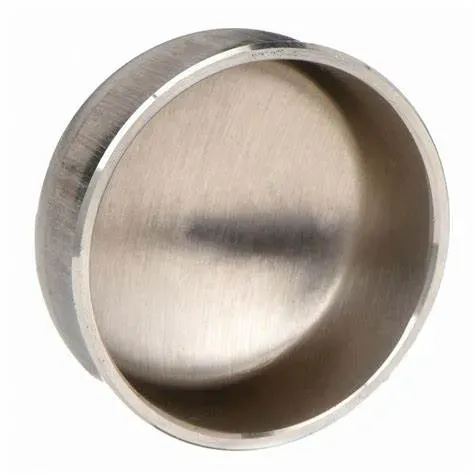-
Cangzhou Yulong Steel Co., Ltd.
-
Phone:
+86 13303177267 -
Email:
admin@ylsteelfittings.com

Nov . 07, 2024 12:19 Back to list
SS304 Welded Pipe Features Applications and Benefits for Various Industries
Overview of SS304 Welded Pipe
Stainless steel has become a significant material in various industries due to its corrosion resistance, durability, and versatility. Among the various stainless steel grades available, SS304 is one of the most commonly used alloys. Known for its excellent mechanical properties and resistance to oxidation and corrosion, SS304 is widely employed in manufacturing welded pipes. This article explores the characteristics, applications, manufacturing processes, and benefits of SS304 welded pipes.
Characteristics of SS304 Stainless Steel
SS304, often referred to as X5CrNi18-10, is an austenitic stainless steel alloy composed primarily of iron, carbon, nickel, and chromium. It consists of approximately 18% chromium and 10% nickel, contributing to its remarkable corrosion resistance and formability. The material can withstand temperatures up to 870 degrees Celsius in intermittent service and 925 degrees Celsius in continuous service, making it suitable for many high-temperature applications.
The combination of chromium and nickel provides SS304 with a shiny and aesthetically pleasing finish, along with its resistance to staining. Additionally, it has excellent mechanical properties, including elongation, toughness, and strength, making it suitable for applications where both strength and ductility are required.
Manufacturing Process of SS304 Welded Pipes
The production of SS304 welded pipes involves several stages, which include cutting, forming, welding, and finishing. The primary materials used for the manufacturing of these pipes are stainless steel sheets or coils.
1. Cutting Stainless steel sheets are cut into specific lengths suitable for the desired pipe diameter.
2. Forming The segments are then formed into cylindrical shapes using a process called roll forming. This step creates the initial structure required for pipe welding.
3. Welding The edges of the formed sheets are joined together primarily through electric resistance welding (ERW) or tungsten inert gas (TIG) welding. ERW involves passing a high-frequency electric current through the edges of the sheets, which causes them to melt and fuse together. TIG welding, on the other hand, uses a non-consumable tungsten electrode to produce a weld, which results in high-quality, clean joints.
4. Finishing After welding, the pipes undergo a series of finishing processes, including pickling and passivation, to remove any oxides and contaminants and improve corrosion resistance.
This entire process ensures that the produced welded pipes meet the stringent standards set by various industrial applications.
Applications of SS304 Welded Pipes
ss 304 welded pipe

SS304 welded pipes find extensive usage in multiple sectors, including
- Food and Beverage Industry Due to its non-reactive nature and ability to be easily sterilized, SS304 stainless steel is ideal for piping in food processing and beverage production. - Chemical and Pharmaceutical Industries These industries often employ SS304 welded pipes for the transport and manufacture of various chemicals and pharmaceuticals since the material can withstand harsh environments and resist corrosion.
- Construction and Architecture SS304 pipes are used in structural applications, handrails, and architectural features where aesthetics and longevity are crucial.
- Oil and Gas Industry They are suitable for low to medium-temperature applications where corrosion resistance is critical.
Advantages of SS304 Welded Pipes
1. Corrosion Resistance One of the most significant advantages of SS304 is its ability to resist corrosion, which prolongs the life span of the pipes and reduces maintenance costs.
2. Strength and Durability The mechanical properties of SS304 ensure that the pipes can withstand high pressures and temperatures.
3. Versatile Applications The adaptability of SS304 allows it to be used across various industries, making it a valuable material.
4. Ease of Fabrication SS304 welded pipes are easy to fabricate and can be formed into various shapes and sizes to meet specific project requirements.
5. Aesthetic Appeal The attractive finish of SS304 makes it suitable for applications where appearance is essential.
Conclusion
In summary, SS304 welded pipes are a vital component in many industries due to their excellent mechanical properties, resistance to corrosion, and versatility. The manufacturing process ensures high-quality products that meet the needs of diverse applications, from food processing to construction. As industries continue to evolve, SS304 welded pipes will remain integral in promoting safety, durability, and efficiency.
Latest news
-
ANSI 150P SS304 SO FLANGE
NewsFeb.14,2025
-
ASTM A333GR6 STEEL PIPE
NewsJan.20,2025
-
ANSI B16.5 WELDING NECK FLANGE
NewsJan.15,2026
-
ANSI B16.5 SLIP-ON FLANGE
NewsApr.19,2024
-
DIN86044 PLATE FLANGE
NewsApr.19,2024
-
DIN2527 BLIND FLANGE
NewsApr.12,2024
-
JIS B2311 Butt-Welding Fittings LR/SR 45°/90° /180°Seamless/Weld
NewsApr.23,2024
-
DIN2605-2617 Butt-Welding Fittings LR/SR 45°/90°/180° Seamless/Weld
NewsApr.23,2024











